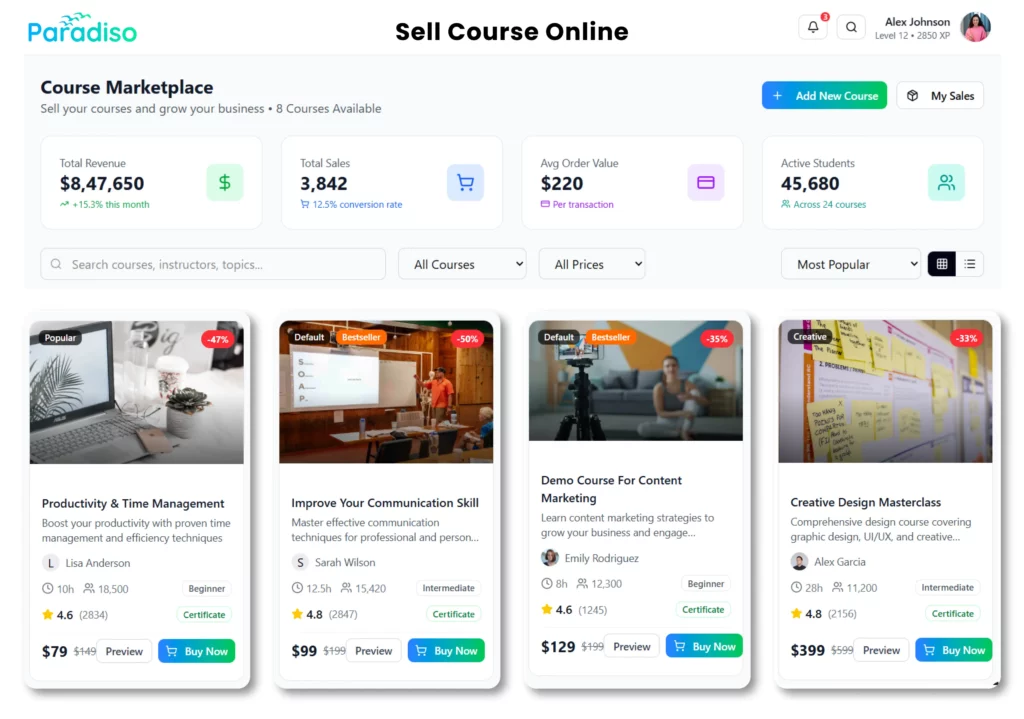If you’re exploring online learning solutions for your organization, you might have already noticed the appeal of free LMS platforms. They promise zero-cost access to course creation, training management, and learner engagement tools. But after a few weeks of using them, many organizations face a harsh reality—the limitations of free LMS platforms can hold back your training programs and affect learning outcomes.
We get it. You want a solution that’s affordable yet effective, easy to use yet robust. That’s why understanding these limitations and knowing how to overcome them is crucial. In this article, we’ll walk you through common challenges, give relatable examples, and offer actionable solutions—all from a practical, reader-first perspective.
All-in-One Free LMS for Organizations Across Industries
Say goodbye to trials and unreliable open-source solutions. Unlock the full potential of your team with Paradiso’s free LMS – the easiest way to streamline learning and development.
1. Limited Customization and Branding
One of the first frustrations many users encounter is the lack of personalization. Free LMS platforms often come with pre-set themes, minimal branding options, and limited control over user experience. Imagine rolling out a training program for your employees and finding that your logo, colors, and messaging can’t be incorporated. It feels impersonal and less engaging for learners.
Solution: Consider platforms like Paradiso LMS that offer free plans with the flexibility to customize dashboards, themes, and learning paths. Even with a limited budget, you can create a branded experience that reflects your organization’s identity, making learners feel more connected.
2. Scalability Challenges
Free LMS platforms are perfect for small-scale projects or pilot programs, but as your organization grows, they often struggle to keep up. You might find limitations in the number of users, courses, or storage capacity, which can slow down learning adoption across teams.
Example: A startup begins with 50 employees and uses a free LMS. Six months later, the company doubles in size, but the free plan caps user access at 100. Suddenly, the system no longer meets your growing needs.
Solution: Look for LMS solutions like Paradiso LMS that offer a free starter plan with an easy upgrade path. This ensures you can scale your learning platform without losing progress, content, or user data.
3. Limited Features and Reporting
Tracking learner progress is essential to measure training effectiveness. Unfortunately, free LMS platforms often provide only basic reporting features. This makes it difficult to generate actionable insights, evaluate ROI, or identify areas that need improvement.
Example: You conduct compliance training across departments but can only see which courses were completed, without detailed insights into learner engagement or performance.
Solution: Choose an LMS that provides advanced reporting, even at the free level. Paradiso LMS offers ready-to-use reports and dashboards that let you track learner progress, quiz performance, and engagement metrics—all in real time. This way, you make data-driven decisions for continuous improvement.
4. Lack of Integrations
Your LMS should work seamlessly with other tools, like HR systems, CRMs, and content libraries. Free platforms often lack integrations, forcing teams to manually update data or juggle multiple platforms.
Example: You want to sync employee progress with your HR system for performance reviews, but your free LMS doesn’t support it. Now, someone has to manually track completion, increasing workload and errors.
Solution: Platforms like Paradiso LMS support multiple integrations, including HRIS, CRM, and content authoring tools. With these connections, your workflow becomes smoother, data stays consistent, and your team saves valuable time.
🚀 Ready to See Paradiso LMS in Action?
Let's show you how Paradiso LMS can work for you.
🎯 Book a Demo5. Limited Support and Community Access
When you hit a technical glitch or have questions about using the LMS effectively, free platforms may only offer minimal support. This can be frustrating and slow down your learning initiatives.
Solution: Consider an LMS that provides robust support options, including live chat, email assistance, and knowledge bases. Paradiso LMS offers a supportive community and responsive help even for free-tier users, so you’re never stuck figuring things out on your own.
6. Challenges in Engaging Learners
One common limitation of free LMS platforms is the lack of interactive tools like gamification, quizzes, discussion forums, and AI-driven learning paths. Without these, learners can quickly lose interest, and engagement drops.
Example: You launch a mandatory onboarding course, but employees rush through it, and comprehension is low because the course feels dry and unengaging.
Solution: Look for an LMS that includes gamification, interactive elements, and AI-based recommendations even at the free level. Paradiso LMS makes it possible to create engaging and personalized learning experiences that keep learners motivated and improve knowledge retention.
7. Security and Compliance Concerns
Free LMS platforms may not provide strong security features or compliance standards. If your organization handles sensitive data or operates in regulated industries, this could pose serious risks.
Solution: Choose a learning platform that emphasizes data security and compliance. Paradiso LMS ensures secure user authentication, encrypted data, and adherence to industry standards, helping you train your employees safely without compromising information integrity.
8. How to Maximize the Benefits of a Free LMS
Even with the limitations, free LMS platforms can be a great starting point if you plan strategically. Here are actionable tips:
- Start small: Use free plans for pilot programs before scaling.
- Prioritize content quality: Focus on high-value, engaging courses rather than quantity.
- Leverage available features: Fully explore dashboards, reporting, and basic integrations to maximize efficiency.
- Plan for upgrades: Choose a platform like Paradiso LMS that allows seamless transition to paid tiers when your needs grow.
By approaching free LMS platforms with a clear strategy, you can enjoy cost-effective learning without compromising quality or scalability.
Conclusion: Overcome LMS Limitations with Smart Choices
The limitations of free LMS platforms can feel frustrating—but they don’t have to derail your training programs. By understanding these challenges, exploring scalable and feature-rich platforms like Paradiso LMS, and implementing smart strategies, you can build a learning ecosystem that grows with your organization.













